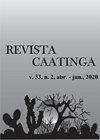Use of hydrogen peroxide for acclimation of sorghum plants to salt stress
IF 0.9
4区 农林科学
Q3 AGRONOMY
引用次数: 0
Abstract
ABSTRACT The use of chemical conditioners, such as hydrogen peroxide (H2O2), is important for mitigating deleterious effects caused by salt stress on plants. This practice can increase the production of agricultural crops, including sorghum, in the Semiarid region of Brazil. In this sense, the objective of this study was to evaluate effects of different electrical conductivities of the irrigation water and H2O2 concentrations on plant growth and biomass accumulation of sorghum plants grown in the Semiarid region of Brazil. The experiment was conducted from November 2020 to January 2021 in a greenhouse at the Center for Agri-Food Sciences and Technologies of the Federal University of Campina Grande, in Pombal, Paraiba, Brazil. A randomized block experimental design was used, in a 4×4 factorial arrangement, consisted of four electrical conductivities of the irrigation water [0.30 (control), 1.50, 3.50, and 5.50 dS m-1] and four H2O2 concentrations [0 (control), 6, 12, and 18 µM], with three replications and one plant per plot, totaling 48 experimental units. Plant height, stem diameter, flag leaf length, and fresh and dry weights of leaves and stems were evaluated. The results showed that applying irrigation water with electrical conductivities higher than 1.50 dS m-1 decreases plant growth and biomass accumulation in sorghum plants. Treating sorghum seeds with H2O2 concentrations of up to 12 µM mitigates adverse effects caused by salt stress on sorghum plants subjected to the salinity levels evaluated in the present study.过氧化氢在高粱植物适应盐胁迫中的应用
过氧化氢(H2O2)等化学调理剂的使用对于减轻盐胁迫对植物的有害影响非常重要。这种做法可以增加巴西半干旱地区包括高粱在内的农作物产量。因此,本研究的目的是评价灌溉水不同电导率和H2O2浓度对巴西半干旱区高粱植株生长和生物量积累的影响。该实验于2020年11月至2021年1月在巴西帕拉伊巴邦巴尔市坎皮纳格兰德联邦大学农业食品科学与技术中心的温室中进行。采用随机区组试验设计,按4×4因子排列,包括灌溉水的4种电导率[0.30(对照)、1.50、3.50和5.50 dS -1]和4种H2O2浓度[0(对照)、6、12和18µM], 3个重复,每地块1株,共48个试验单元。对株高、茎粗、旗叶长、鲜重和干重进行了评价。结果表明,施用电导率大于1.50 dS - m-1的灌溉水会降低高粱植株的生长和生物量积累。用浓度高达12µM的H2O2处理高粱种子可以减轻盐胁迫对高粱植株造成的不利影响。
本文章由计算机程序翻译,如有差异,请以英文原文为准。
求助全文
约1分钟内获得全文
求助全文
来源期刊

Revista Caatinga
AGRONOMY-
CiteScore
2.10
自引率
11.10%
发文量
67
审稿时长
6-12 weeks
期刊介绍:
A Revista Caatinga é uma publicação científica que apresenta periodicidade trimestral, publicada pela Pró-Reitoria de Pesquisa e Pós-Graduação da Universidade Federal Rural do Semi-Árido – UFERSA, desde 1976.
Objetiva proporcionar à comunidade científica, publicações de alto nível nas áreas de Ciências Agrárias e Recursos Naturais, disponibilizando, integral e gratuitamente, resultados relevantes das pesquisas publicadas.
 求助内容:
求助内容: 应助结果提醒方式:
应助结果提醒方式:


